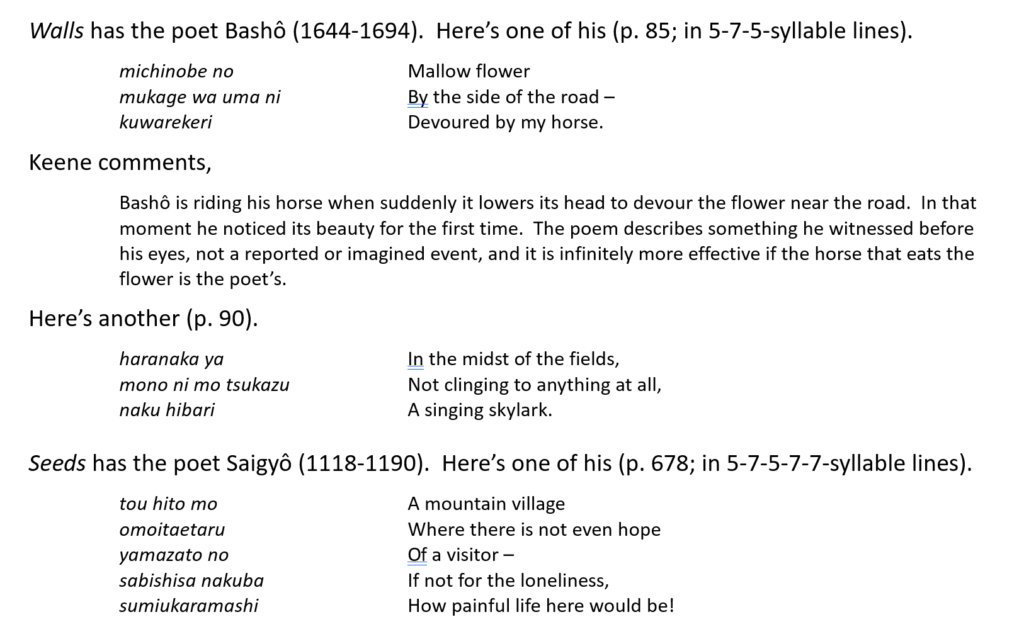By John Hertz: It’s National Poetry Month in the United States.
I didn’t dare submit this for posting on April 1 (if Our Gracious Host so wished). You might have thought I was fooling.
As I sometimes am.
Since Edgar Allan Poe wrote fantasy and science fiction, was poetic in prose and verse, and remains worth trying 170 years after his death, you could argue for calling this National Poe-try Month.
Go right ahead.
I’ve brought your attention to Chinese poetry – sometimes thought, with reason, to be the greatest in the world. Just now I’m going to write about Japanese.
For centuries many of the great Japanese poets also wrote Chinese poetry. Chinese was part of a good Japanese education, like Latin in a good European education. One of the finest Japanese anthologies, the Kokinshû (920; short for Kokin Waka Shû, “Old-and-New Poetry Book”), has a Japanese and a Chinese preface. Having a Japanese preface was the unusual gesture.
Japanese poetry is on my mind with the recent death (February 24th) of Donald Keene, one of the great translators of Japanese literature. Yes, that means I rank him with Arthur Waley, which is saying a lot.
“What about Uncle A.J.?” you ask. Quite rightly. A.J. Budrys used to say “Always ask, Why are they telling us this?” So here’s something else to try. Consider whether s-f is poetry.
Heinlein liked the term “speculative fiction”. In a sense science fiction can be thought to include fantasy. Or it could be the other way round. Sturgeon said “Science fiction is knowledge fiction”: one of his better puns; science, in its Latin root, means knowledge.
Vladimir Nabokov said (“Good Readers and Good Writers”, in Lectures on Literature, posth. 1980; you can look here):
The work of art is invariably the creation of a new world, so that the first thing we should do is to study that new world as closely as possible, approaching it as something brand new, having no obvious connection with the worlds we already know. When this new world has been closely studied, then and only then let us examine its links with other worlds, other branches of knowledge….
Bleak House [C. Dickens, 1853], that fantastic romance within a fantastic London, can we call it a study of London a hundred years ago? Certainly not…. The truth is that great novels are great fairy tales.
…. minor readers like to recognize their own ideas in a pleasing disguise. But the real writer, the fellow who sends planets spinning … has no given values at his disposal: he must create them himself.
I’ve said “Cross-cultural contact is homework for s-f.”
So let’s go to Japan.
I recommend two of Keene’s books, World Within Walls (1976) and Seeds in the Heart (rev. 1999). Walls surveys Japanese literature during the years the country was closed to foreigners; Seeds from earliest times to the beginning of Walls.

About s-f, Niven and Campbell have each said it’s Minds as good as you but different.
Happy National Poetry Month.
Discover more from File 770
Subscribe to get the latest posts to your email.

Those were beautiful. Thanks, John.
Some coincidence. I just started looking into Ezra Pound, and one of the first things I found was his book of not-quite-translations of Asian poetry (and The Wanderer). I haven’t read enough of it yet to have formed an opinion, but I was trying to figure out what’s good about Pound, and this is the first thing I’ve seen that really beckons to me.